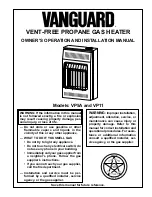
17/01
USE OUTDOORS ONLY!
The heater is designed and approved for use as a construction heater in accordance with ANSI Z83.7 - CSA 2.14.
CHECK WITH YOUR LOCAL FIRE SAFETY AUTHORITY IF YOU HAVE QUESTIONS ABOUT APPLICATIONS. The
intended use is the temporary heating of buildings or structures under construction, alteration or repair.
Other standards govern the use of fuel gases and heat producing products in specific applications. Your local
authority can advise you about these. The date of issue, or equivalent, to relate the heater with its instructions.
CAUTION: Read all Warnings and Operating Instructions before use and retain for future reference.
FOR YOUR SAFETY
Do not store or use gasoline or other liquids with flammable vapors in the vicinity of this or any other appliance.
The heater should be inspected before each use, and at least annually by a qualified service person. The
installation must conform with local codes or, in the absence of local codes, with the Standard for the Storage and
Handling of Liquefied Petroleum Gases, ANSI/NFPA 58 and the Natural Gas and Propane Installation Code, CSA
B149.1.
If you smell gas:
- Do not attempt to light appliance.
- Extinguish any open flame.
- Do not flip electrical switches.
- Do not pull any power supply or extension cords.
- Do not use telephone in vicinity of gas smell.
- Disconnect fuel supply and evacuate.
CARBON MONOXIDE HAZARD
- This appliance can produce carbon monoxide which has no odor.
- Using it in an enclosed space can kill you.
- Never use this appliance in an enclosed space such as a camper, tent or car.
WARNING
- FOR NON-RESIDENTIAL AND OUTDOOR USE ONLY
- Supply plenty of fresh air when using the camp stove. Do not obstruct the flow of combustion air or ventilation
air.
- Keep away from burnable materials. Do not place the stove any closer than 36” (92 cm) to combustibles.
- Use a flat, level support surface where the stove is safe from accidental tipping.
- Use only 16.4oz disposable propane cylinders propane fuel cylinders marked USDOT-39 or TC CAN/CSA B339.
-
Never touch heater while in operation to avoid injury. Move heater by grasping the propane cylinder carefully.
- Do not use this heater for heating human living quarters.
- Do not use in unventilated areas.
- The flow of combustion and ventilation air must not be obstructed.
- Combustion process requires and consumes oxygen, and will produce carbon monoxide. THIS HEATER MUST
BE USED WITH ADEQUATE VENTILATION. Do not use inside a house, camper, tent or any type of unvented
or a tightly enclosed area.
- Lack of proper ventilation air will lead to improper combustion. Improper combustion can lead to carbon
monoxide poisoning leading to serious injury or death. Provide additional ventilation for any additional
fuel-burning appliances and additional occupants.
- DO NOT USE THIS HEATER ON PROPANE CYLINDER GREATER OR LESS CAPACITY THAN 16.4 OZ.
- NEVER attempt to operate the heater inside any vehicle, camper or enclosed area.




























